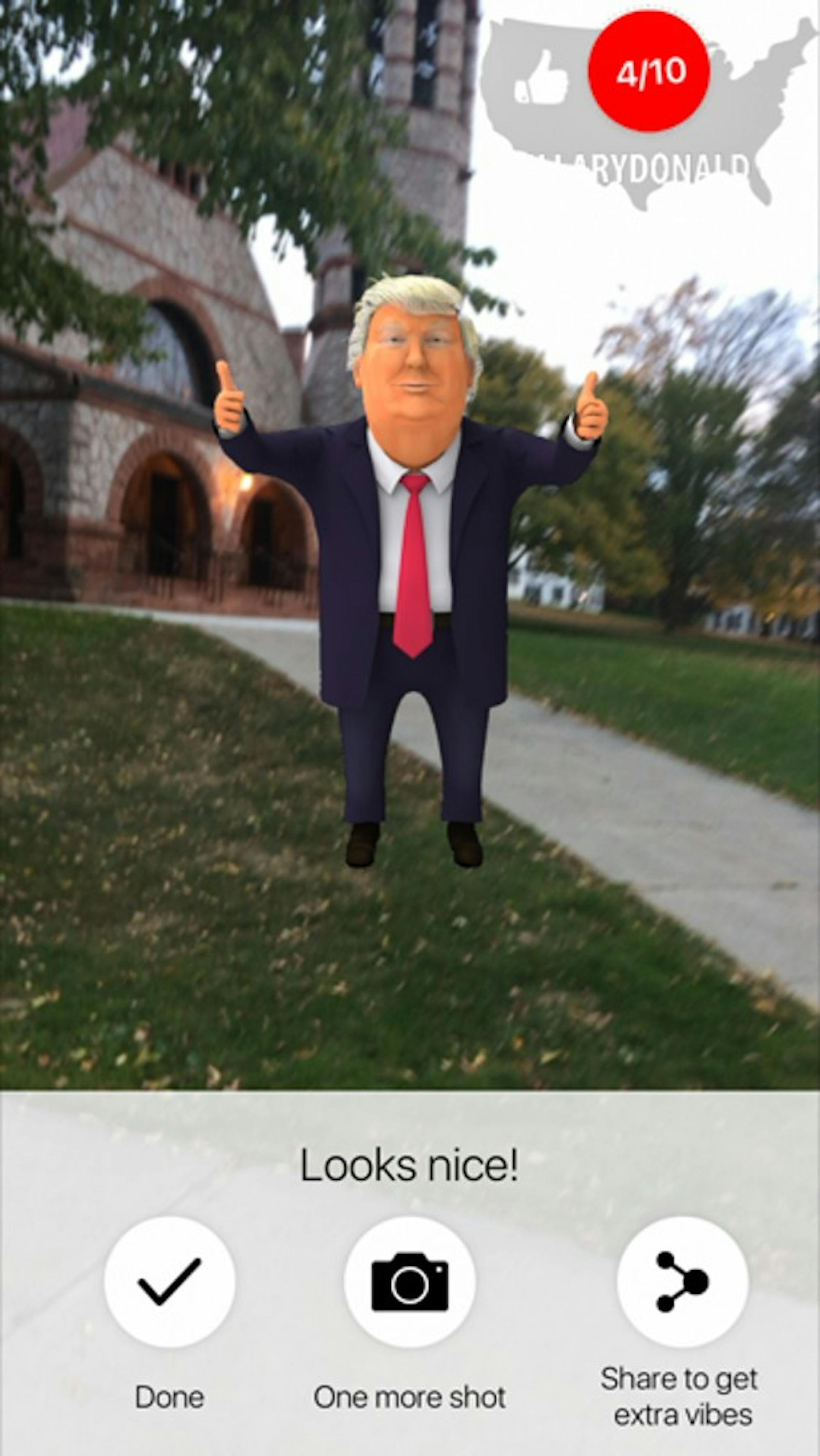With two presidential candidates possessing historically low approval ratings, the tone of the 2016 election has been less cordial than usual. As a result, many Americans have grown frustrated with this election, which pundits fear will depress voter turnout.
Government professor Joseph Bafumi and Russian professor Mikhail Gronas are trying to reverse this trend through their new app called “HillaryDonald Go,” an election-themed augmented reality game.
“One purpose is to get more people excited about and involved in the election,” Bafumi said. He added that he hopes the app will generate excitement among younger people about participating in the election.
The free app, loosely based on the popular game “Pokémon Go,” became available on the App Store last week. Upon launching the game, the player’s geographic location is placed on a map. Then, several “booths” appear on the map near the player’s location.
“There are about one million booths around the country, in locations such as cafes, university buildings, Wal-Mart stores, parks, bridges [and] various landmarks,” Gronas said. On campus, booths can be found at places like Rauner Library, Wilder Hall, Parkhurst Hall and Alumni Gym.
As players enter within a 50-meter radius of a booth, a large green button appears. After pressing the button, the players’ cameras turn on, and augmented reality versions of candidates Hillary Clinton and Donald Trump appear on the screen.
Players then choose their favorite candidate by touching that candidate on the screen. The selected candidate’s figure increases in size and says a quote from the campaign trail, such as Trump saying “wow” or Clinton saying “thank you very much.”
Players then have the opportunity to show their level of enthusiasm for that candidate. Players have 10 seconds to send positive “vibes” to their candidate by shaking their phone. The more they shake their phone, the more positive vibes are sent.
“Sending vibes is essentially analogous to voting; sort of a ‘gamified’ voting,” Gronas said. He added that the server calculates the total amount of vibes for each candidate at each booth.
For the candidate who has the majority of vibes at a given time, their face appears on that booth on the game map. Additionally, a color-coded circular band around their face shows the proportion of vibes for each candidate, with blue and red signifying Clinton’s and Trump’s vibes, respectively.
After sending their vibes, players have the opportunity to take a picture with their virtual candidate at the booth, and then move on to new booths. The ultimate goal of the game is to help your candidate “take over” the town by winning as many booths as possible.
In addition to bolstering excitement about the election, the app can provide useful information on political sentiment across the country, Bafumi said.
“From a social science perspective, we’re hopeful that with enough users, we’re going to be able to get a sense of not only candidate support but also candidate enthusiasm,” he said.
For college-aged voters, enthusiasm has been a major theme of this election, given the historically low voter participation of this demographic.
“We expect more people to vote in this election than ever before and with the stakes for students being so high, we welcome efforts to increase voter participation,” said Victor Reyes, the New Hampshire press secretary for the Clinton campaign.
The Trump campaign did not respond to a request for comment as of press time.
Bafumi said the app could affect turnout by informing voters of the level of support for the candidates in their area, and might influence younger people who are familiar with augmented reality games to vote. He added that he expects this demographic group to be the primary user base for the app.
Gronas said he sees the new app as a test of new technology, which mixes augmented reality gaming with political polling. He added that this app could demonstrate that gamifying public political sentiment might produce scientific results, despite the unscientific means of collecting data.
“HillaryDonald Go” is the third in a series of apps that Bafumi and Gronas have worked on together. One of the apps, “HillaryDonald,” uses a program called React to allow users to respond to a variety of major events like presidential debates.
The other app, TwitterScope, analyzes political sentiment on Twitter by applying machine learning and natural language processes to real-time analysis of journalists and politicians on Twitter.
Bafumi said that after this election, he hopes this technology can be expanded to future elections outside the United States, including democratic elections in Europe.
For now, however, “HillaryDonald Go” players can expect updates to the app coming soon, which will add entertaining twists to the gameplay.
“Pretty soon you will see the Hillary Clinton emails and Donald Trump’s tax forms lying around,” Gronas said. He said collecting these files will help players gain additional vibes for their candidates.
Gronas said given the overly dramatic nature of this election, the app can play an important role in lightening the mood.
“We hope this game will help people loosen up a bit,” he quipped.




